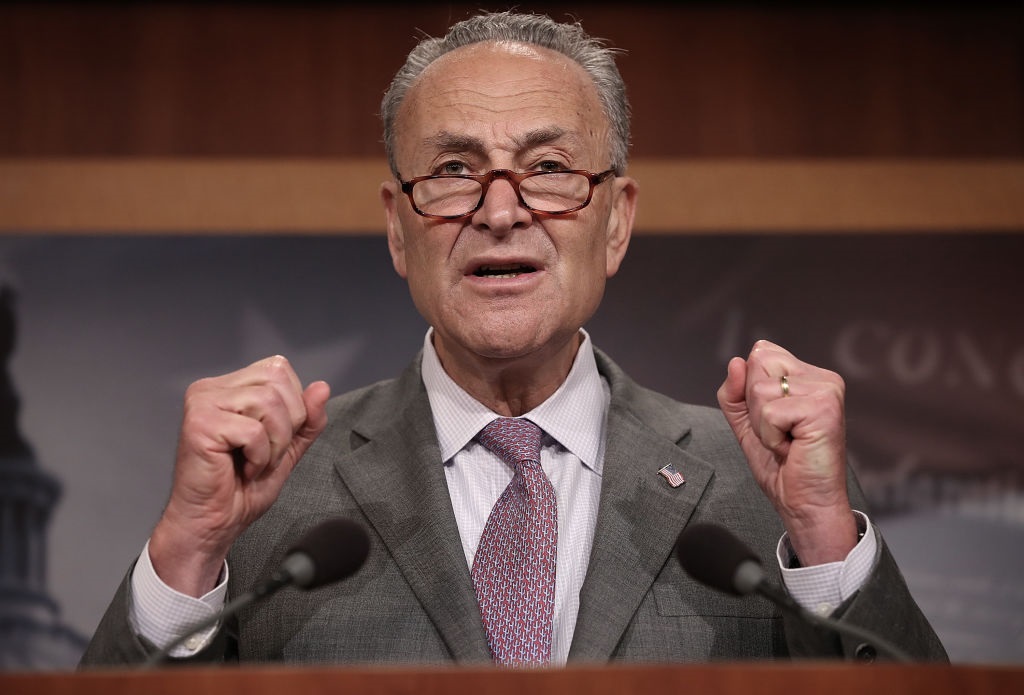After sitting on the Fiscal Year 2022 National Defense Authorization Bill (NDAA) for weeks, Senate Majority Leader Chuck Schumer (D-NY) tried to combine the defense bill with the U.S. Innovation and Competition Act of 2021 (USICA). This would have stalled the FY2022 NDAA while the new combined bills were considered. As a result, military pay raises and new starts for critically needed weapons programs would be delayed, and all existing programs would be funded only at last year’s level.
 Additionally, the USICA would have been held in abeyance as well. Defense News sounded the alarm on November 16, saying, “Legislation to make the US manufacturers more competitive with China could instead end up swamping the military’s annual defense authorization bill in complex congressional negotiations, the Democratic chair of the House Armed Services Committee warned Tuesday.” But, in the end, cooler heads prevailed.
Additionally, the USICA would have been held in abeyance as well. Defense News sounded the alarm on November 16, saying, “Legislation to make the US manufacturers more competitive with China could instead end up swamping the military’s annual defense authorization bill in complex congressional negotiations, the Democratic chair of the House Armed Services Committee warned Tuesday.” But, in the end, cooler heads prevailed.
Jordain Carney, writing for The Hill explained, that Schumer:
“…delayed the vote as Republicans threatened to block the bill because Schumer wanted to include anti-China competitiveness legislation in the defense bill…Some Republicans oppose including the competitiveness legislation in the defense bill altogether, while others believed Schumer was trying to make changes to the China legislation to strip out trade language that was included when the Senate passed the bill earlier this year.”
After an extended amount of time haggling out the issues in the Senate Wednesday, November 18, the majority leader’s gambit was discarded in favor of the bills being considered separately on the merit of each.
The latest report from a joint statement by Schumer and Speaker of the House Nancy Pelosi (D-CA) stated:
“Today, we are pleased to announce that we have reached an agreement for the House and Senate to go to conference on the United States Innovation and Competition Act. Working with President Biden, the House and Senate have been crafting bipartisan legislation to bolster American manufacturing, fix our supply chains, and invest in the next generation of cutting-edge technology research.”
Having garnered bipartisan support from both Republicans and Democrats and passed the Senate, though currently held up in the House, the USICA going to conference effectively separates and forecloses the option of combining the bills. This action allows the FY22 NDAA to go to the Senate floor any time, with passage likely more rapid than had the two bills been combined. Having the floor debate and vote on the defense authorization bill as a stand-alone item will provide authorizing top cover for the pending defense appropriations package.

Tim Kaine
(Photo by Win McNamee/Getty Images)
“I think what we would like to do would be to finish the NDAA before Thanksgiving, so it could be later this week, it could be into Friday or Saturday, it could be early next week,” Sen. Tim Kaine (D-VA) reportedly told The Hill.
The USICA is an essential piece of legislation in its own right, as it allows the U.S. to take a much stronger position in the intense competition with China. Liberty Nation has written extensively on the threat that communist country poses in the semiconductor and high-tech markets. America is essentially held hostage to Beijing’s willingness and capacity to provide semiconductors mainly. The paucity of microelectronics and exposure of critical electronic components to “intellectual property theft, sabotage, pilferage, and counterfeiting” is a national security threat. The USICA, passed by the Senate last June, is a first step in addressing the competition with the Chinese Communist Party in a high-tech, high-stakes market. Access Partnership, in its analysis of the $250 billion legislation, explains:
“Other Senate priorities included on the bill span from subsidies for semiconductor manufacturing and Open Radio Access Networks (Open RAN) to human space exploration and 1,500 pages of further Senate priorities. Taken together, the bill is America’s first dance with large scale industrial policy, and marks the largest injection of non-military public funds in emerging and new technologies in decades.”
Splitting the two funding measures so that each pass separately is a legislative win-win. The defense bill will ensure that national security programs will proceed without further speed bumps. The USICA will provide the first real whole-of-government answer to bringing back critical technology manufacturing to the U.S. and emphasizing research and development. Separately, they both have bipartisan support and will be passed with fewer amendments than had they been combined. Occasionally the legislative process works. However, no one should count their legislation until it’s hatched.
The views expressed are those of the author and not of any other affiliation.
~ Read more from Dave Patterson.




